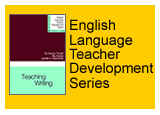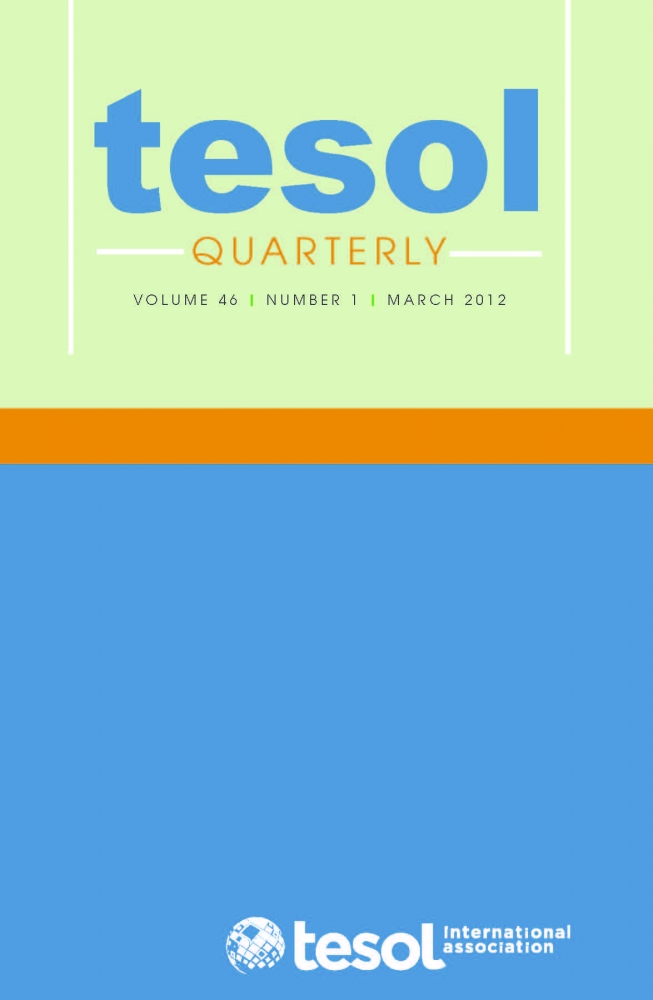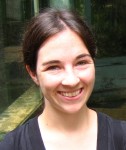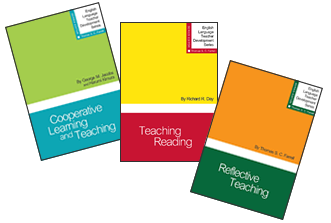Free Chapter from
Teaching Writing:
"Addressing Cultural Differences"
 Because language and culture are so intimately connected, it is not surprising that the issue of cultural difference plays a role in how students write in a second language. For some students, learning to write in English involves a process of cultural and identity change. They may need to change or acquire a second writing culture and manage possible conflicts between their cultural identity and standard Because language and culture are so intimately connected, it is not surprising that the issue of cultural difference plays a role in how students write in a second language. For some students, learning to write in English involves a process of cultural and identity change. They may need to change or acquire a second writing culture and manage possible conflicts between their cultural identity and standard
academic English.
By examining the cultural and dialectical differences that students bring to the classroom, teachers can become better readers of students’ writing, and students can make more informed writing choices. In this chapter, we examine differences in writing culture and dialect, and we provide suggestions for developing assignments that allow students and teachers to reach a deeper understanding of these differences.

Writing Cultures
First, let us consider what is meant by writing culture. Writing teachers often assign different tasks for different purposes. For instance, some teachers use writing to evaluate students’ knowledge of the material. However, in a classroom in which writing is seen as a process of making one’s own meaning, a student who writes to display knowledge may be seen as not doing enough analysis. To give another example, in many countries it is considered inappropriate or even risky to critique the government. When a student from such a country is asked to engage in critique, he or she may find it hard to do so. Because of these differences, it is important for teachers to consider students’ writing backgrounds...
TC Monthly Giveaway Congratulations to Gerardo Chavez of Chiapas, Mexico, for being the winner of the March 2013 TESOL Connections Monthly Giveaway. Gerardo won a free English Language Teacher Development book set.
This month, TESOL is giving away a free subscription to
TESOL Quarterly!

TESOL Quarterly is a refereed professional journal that fosters inquiry into English language teaching and learning by providing a forum for TESOL professionals to share their research findings and explore ideas and relationships in the field.
Click here to enter
Drawing closes 28 April 2013, 11:59 pm EST
TESOL Blogs Interested in writing a blog for TESOL?
Contact Tomiko Breland with your idea or for details.
Check out the latest TESOL Blogs:
|
The Language Pill, Perpetual Toothbrushes, and Other Whimsical Inventions, by Alexandra Lowe
 Do you have certain communicative activities that you find work no matter what level you are teaching? Are there activities that you can always turn to when the energy in the classroom starts to flag? Do you have certain communicative activities that you find work no matter what level you are teaching? Are there activities that you can always turn to when the energy in the classroom starts to flag?
In this regard, I wanted to share with you an activity that Irina Climovici, a colleague from SUNY Westchester Community College, taught me last year and that has stood me in good stead ever since. I used it last week when it became apparent that my Level 5 evening students, who had enthusiastically debated the merits of investing in derelict buildings in Detroit and had written at length about the impact of the Great Recession on their own lives, were running out of steam as the clock ticked toward 9 p.m. Read More. |
|
From the Perspective of a Student, by Tara Arntsen
 Since I am advocating for teaching using technology, I would like to note that I have also studied extensively online using all sorts of technology. While it is not the same as integrating technology into traditional classroom-based lessons, I wanted to share these experiences with you anyway, mostly as proof that online learning is still real learning. My best experiences studying online have been with the University of Southern California and Udacity. Read More. Since I am advocating for teaching using technology, I would like to note that I have also studied extensively online using all sorts of technology. While it is not the same as integrating technology into traditional classroom-based lessons, I wanted to share these experiences with you anyway, mostly as proof that online learning is still real learning. My best experiences studying online have been with the University of Southern California and Udacity. Read More.
|
|
TESOL 2013 Graduate and Doctoral Student Forums Combine for Memorable Day, by Elena Andrei
 The TESOL Graduate Forum and the TESOL Doctoral Forum are wonderful one-day events usually held the Wednesday before the TESOL Annual Convention & English Language Expo. If you are a graduate student in TESOL, ESL/EFL, or applied linguistics, I would encourage you to attend. The TESOL Graduate Forum and the TESOL Doctoral Forum are wonderful one-day events usually held the Wednesday before the TESOL Annual Convention & English Language Expo. If you are a graduate student in TESOL, ESL/EFL, or applied linguistics, I would encourage you to attend.
At TESOL 2013, the Doctoral and Graduate Forums joined talents and forces. We had a great event in which students were involved in vibrant discussions about teaching, researching, and learning in the TESOL field.
One highlight of the day.... Read More. |
TESOL Bookstore

NEW!
Language Teacher Development Series
Thomas S. C. Farrell, series editor

Perfect for MA Programs, Skills Courses, ESL, EFL, EIL, and ESOL Classrooms:
Toll Free: 888-981-0041
E-mail: tesol@brightkey.net
|
 |
|
|
 |
| English Language Fellow Program, U.S. Department of State, USA
Director, English Language Institute (IEP), The University of Akron, Akron, Ohio, USA
Assistant Professor, Alliant International University, San Diego, CA, USA
Worldwide Fellowships Available, English Language Fellowship Program, USA
Assistant/Associate Professor Faculty Positions, Faculty of Communication, Nagoya University of Commerce & Business, Japan
Elementary Teacher, Northridge School, Mexico City, Mexico
Postdoctoral Scholar, Center for English as a Second Language, University of Kentucky, Kentucky, USA
Teach ESL Internationally on U.S. Embassy Projects, English Language Fellow Program, U.S. Department of State, USA
Want to post your open positions to Job Link? Click here.
To browse all of TESOL's job postings, check out the TESOL Career Center. |
 |
|
 |
| ADVERTISEMENT |

|
 |
|